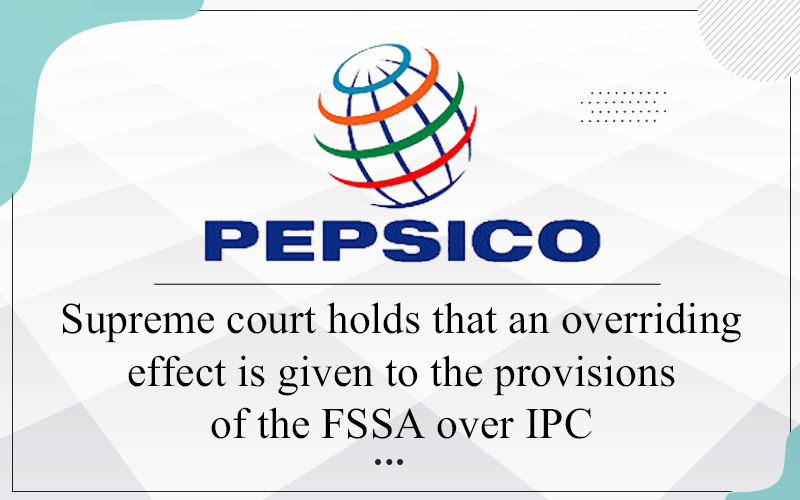RAM NATH [APPELLANT] Vs. THE STATE OF UTTAR PRADESH & ORS. [RESPONDENT(S)]
(CRIMINAL APPEAL NO. 472 OF 2012)
(2JB, Abhay S. Oka and Sanjay Karol JJ., delivered by ABHAY S. OKA, J.)
Facts: The issue involved in these appeals is about the interplay between the provisions of Chapter IX of the Food Safety and Standards Act, 2006 (for short, ‘the FSSA’) and Sections 272 and 273 of the Indian Penal Code (for short, ‘the IPC’).
Issue: Whether the view taken in the case of Pepsico India, which is the subject matter of challenge in Criminal Appeal No. 476478 of 2012, is correct?
Arguments on behalf of counsel for appellants:
The submission is that there is no bar to the trial of an offender under two different enactments, but the bar is only to the punishment of the offender twice for the same offence. The learned counsel submitted that where an act or omission constitutes an offence under two enactments, the offender may be prosecuted under either one of the two enactments or both enactments but shall not be liable to be punished twice for the same offence. Reliance was placed upon Section 26 of the General Clauses Act, 1897 (for short, ‘the GC Act’). Learned counsel for the State also relied upon another decision of this Court in the case of State of M.P. v. Kedia Leather & Liquor Ltd. and Ors. He submitted that the area of operation of the IPC and a food related law like the FSSA are entirely different and, therefore, the same are mutually exclusive. The learned counsel urged that Section 89 gives overriding effect to the provisions of the FSSA over all other food related laws, as is evident from the title of the Section. He submitted that the IPC is not a food related law by any stretch of the imagination. Therefore, wherever Sections 272 and 273 of the IPC are attracted even after coming into force of the FSSA, the offender can be prosecuted under the said IPC provisions.
Arguments on behalf of counsel for respondents:
The learned counsel appearing for the accused invited our attention to the objects and reasons of the FSSA and its preamble. Their submission is that the FSSA is very exhaustive legislation dealing with all aspects of food, including adulteration, unsafe food, etc. Their submission is that Section 89 will have an overriding effect over the provisions of the IPC. Our attention is also invited to Section 5 and Section 41 of the IPC. The submission is that in view of Section 5, any special law will remain unaffected by the provisions of the IPC. Reliance was placed on a decision of this Court in the case of Jeewan Kumar Raut & Anr. v. Central Bureau of Investigation. The counsel for the accused also placed reliance on the decision of this Court in the case of State of Uttar Pradesh v. Aman Mittal and Anr, support of the proposition that the FSSA, being a special law, will exclude the applicability of the IPC for the fields which are covered by the provisions of the special Act.
Held: The court dismissed the present appeals and held that, “The settled law is that if the main Section is unambiguous, the aid of the title of the Section or its marginal note cannot be taken to interpret the same. Only if it is ambiguous, the title of the section or the marginal note can be looked into to understand the intention of the legislature. Therefore, the main Section clearly gives overriding effect to the provisions of the FSSA over any other law in so far as the law applies to the aspects of food in the field covered by the FSSA. In this case, we are concerned only with Sections 272 and 273 of the IPC. When the offences under Section 272 and 273 of the IPC are made out, even the offence under Section 59 of the FSSA will be attracted. In fact, the offence under Section 59 of the FSSA is more stringent.”




